
Cass R. Sunstein
Born: 1954 in Concord, MA
Pen Name: None Connection to Illinois: Professor Sunstein taught at the University of Chicago from 1981 through 2008. Biography: Professor legal scholar, particularly in the fields of constitutional law, administrative law, environmental law, and law and behavioral economics, who was the Administrator of the White House Office of Information and Regulatory Affairs in the Obama administration. For 27 years, Sunstein taught at the University of Chicago Law School. Sunstein is currently the Robert Walmsley University Professor and Felix Frankfurter Professor of Law at Harvard Law School.
Awards:
Website: http://www.law.harvard.edu/faculty/directory/index.html?id=552
Cass R. Sunstein on WorldCat : http://www.worldcat.org/search?q=cass+r.+sunstein
Selected Titles
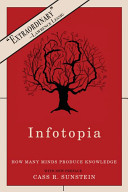 |
Infotopia : ISBN: 0195340671 OCLC: 236383004 Oxford University Press, New York ; 2008. The rise of the "information society" offers not only considerable peril but also great promise. Beset from all sides by a never-ending barrage of media, how can we ensure that the most accurate information emerges and is heeded? In this book, Cass R. Sunstein develops a deeply optimistic understanding of the human potential to pool information, and to use that knowledge to improve our lives. In an age of information overload, it is easy to fall back on our own prejudices and insulate ourselves with comforting opinions that reaffirm our core beliefs. Crowds quickly become mobs. The justification for the Iraq war, the collapse of Enron, the explosion of the space shuttle Columbia--all of these resulted from decisions made by leaders and groups trapped in "information cocoons," shielded from information at odds with their preconceptions. How can leaders and ordinary people challenge insular decision making and gain access to the sum of human knowledge?Stunning new ways to share and aggregate information, many Internet-based, are helping companies, schools, governments, and individuals not only to acquire, but also to create, ever-growing bodies of accurate knowledge. Through a ceaseless flurry of self-correcting exchanges, wikis, covering everything from politics and business plans to sports and science fiction subcultures, amass--and refine--information. Open-source software enables large numbers of people to participate in technological development. Prediction markets aggregate information in a way that allows companies, ranging from computer manufacturers to Hollywood studios, to make better decisions about product launches and office openings. Sunstein shows how people can assimilate aggregated information without succumbing to the dangers of the herd mentality--and when and why the new aggregation techniques are so astoundingly accurate. In a world where opinion and anecdote increasingly compete on equal footing with hard evidence, the on-line effort of many minds coming together might well provide the best path to infotopia. |
 |
Laws of fear : ISBN: 0521615127 OCLC: 252491773 Cambridge University Press, Cambridge, UK ; 2005. This is a book about the complex relationship between fear, danger, and the law, examining the many problems in what is known as 'the precautionary principle'. Laws of Fear represents a major statement from one of the most influential political and legal theorists writing today. |
| Nudge : ISBN: 9781490617732 OCLC: 868601191 Recorded Books, Prince Frederick, MD : [2008], ℗2008. Thaler and Sunstein show that by knowing how people think, we can design choice environments that make it easier for people to choose what is best for themselves, their families, and their society. Using colorful examples from the most important aspects of life, the authors demonstrate how thoughtful choice architecture can be established to nudge us in beneficial directions without restricting freedom of choice. Nudge offers a unique new take--from neither the left nor the right--on many hot-button issues, for individuals and governments alike. |
|
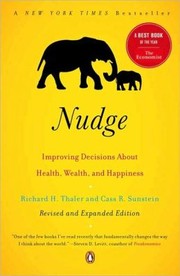 |
Nudge : ISBN: 014311526X OCLC: 181517463 Yale University Press, New Haven, Conn. : ©2008. "A Caravan book"--Title page verso. |
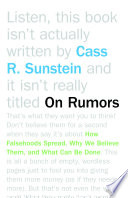 |
On rumors : ISBN: 9780691162508 OCLC: 959736240 Many of us are being misled. Claiming to know dark secrets about public officials, hidden causes of the current economic situation, and nefarious plans and plots, those who spread rumors know precisely what they are doing. And in the era of social media and the Internet, they know a lot about how to manipulate the mechanics of false rumors-social cascades, group polarization, and biased assimilation. They also know that the presumed correctives-publishing balanced information, issuing corrections, and trusting the marketplace of ideas-do not always work. All of us are vulnerable. In On Rumors, Cass Sunstein uses examples from the real world and from behavioral studies to explain why certain rumors spread like wildfire, what their consequences are, and what we can do to avoid being misled. In a new afterword, he revisits his arguments in light of his time working in the Obama administration. |
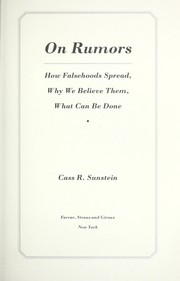 |
On rumors : ISBN: 0809094738 OCLC: 317928909 Farrar, Straus and Giroux, New York : 2009. Offers ways to recognize and respond to misinformation and rumor propagation, explaining how its practice compromises political and professional reputations, in a guide that proposes specific free-speech legislation. |
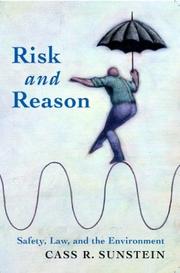 |
Risk and reason : ISBN: 9780521016254 OCLC: 48943694 Cambridge University Press, Cambridge [England] ; 2002. Risk and Reason shows how individual thinking and social interactions lead us in foolish directions. Offering sound proposals for social reform, it explains how a more sensible system of risk regulation, embodied in the idea of a cost-benefit state, could save many thousands of lives and many billions of dollars - and protect the environment in the process.--Jacket. |
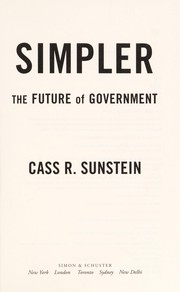 |
Simpler : ISBN: 1476726590 OCLC: 823045388 The co-author of the best-selling Nudge and regulatory advisor to President Obama draws on cutting-edge work in behavioral psychology and economics to trace behind-the-scenes, life-saving policy changes that reflect smarter and simpler government practices while preserving freedom of choice for everyday people in areas ranging from mortgages and student loans to food labeling and health care. |
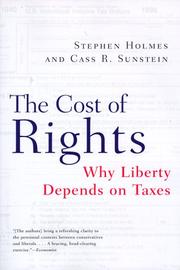 |
The cost of rights : ISBN: 0393320332 OCLC: 46365478 W.W. Norton, New York : 2000. |
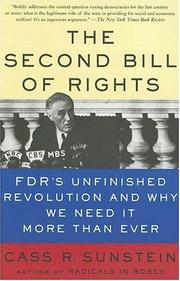 |
The second bill of rights : ISBN: 0465083331 OCLC: 53485245 Using FDR's 1944 State of the Union Address as a starting point, the author delves deeply into the revolutionary mind that penned this remarkable declaration of economic rights and illuminates the demise of this ambitious program for reform in the wake of the president's death. |




